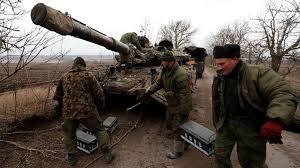By Ben Kerrigan-
The war in Ukraine has meant Britain is more under “nuclear escalation” threat from Russia than at any time since the Cold War, defence chiefs have warned.
Their study of the future for UK defence comes as an M16 boss called for concerned Russians to spy for Britain .
In an extraordinary move, Sir Richard Moore used a speech to reveal a number of individuals had already taken this step over the past 18 months since Russia launched its invasion.
“There are many Russians today who are silently appalled by the sight of their armed forces pulverising Ukrainian cities, expelling innocent families from their homes and kidnapping thousands of children,” Sir Richard said.
“They are watching in horror as their soldiers ravage a kindred country. They know in their hearts that Putin’s case for attacking a fellow Slavic nation is fraudulent,” Sir Moore said.
Meanwhile, the study from defence chiefs notes escalating threats from Moscow whilst China poses a long-term challenge along with North Korea and Iran. And the spectre of terrorism is always a problem.
The Defence Command Paper says: “Europe has not seen this scale of conflict since the end of the Second World War. The threat of nuclear escalation is greater than at any time since the Cold War.”
It argues Russia’s air force and navy is still intact despite more than 500 days of brutal conflict in Ukraine. And the UK’s situation could worsen over Ukraine.
The paper – written by outgoing Defence Secretary Ben Wallace and his deputy, Armed Forces Minister James Heappey- announces a £2.5bn of extra funds for defence chiefs to boost dwindled ammo stockpiles.
It says:“As Russia becomes more isolated internationally as a result of its actions and behaves more volatile so the threat to the UK and our interests will increase.”
Wallace, who presented his study to the Commons, said in the paper: “Our national security is intrinsically linked to the outcome of war in Ukraine.”
It says Britain’s armed forces, which is becoming leaner with several thousand less soldiers, are relying increasingly on resources such as special forces.
Ukraine’s geographical location places it in close proximity to two major nuclear powers: Russia and NATO member states. The conflict in Ukraine has heightened tensions between Russia and NATO, leading to an increased military presence and arms buildup along the borders. The accidental escalation of hostilities or a miscalculation during military drills may inadvertently trigger a larger conflict, putting Britain at risk as a NATO ally.
Russia possesses a significant nuclear arsenal, and the instability in Ukraine raises concerns about the security of these weapons.
The war in Ukraine has been characterized by conventional military engagements and proxy conflicts. However, as tensions rise, there is a real possibility that either party may resort to using nuclear weapons in a desperate bid to secure victory. This escalation could potentially draw Britain into the conflict through its commitment to collective defense as part of NATO, triggering a nuclear conflict that could engulf Europe and beyond.
Nuclear Deterrence and Ambiguity
Russia’s nuclear doctrine includes the concept of “nuclear deterrence by ambiguity,” where it intentionally maintains a degree of uncertainty about its nuclear capabilities and triggers for their use
However, with Russia becoming increasingly isolated in its war with Ukraine, Putin and some of his mouthpieces have hinted at the possibility of the war escalating and involving nuclear weapons, though in such event many experts believe it would be a big loser.
The ongoing conflict in Ukraine could alter Russia’s assessment of threats to its security, potentially leading to a more aggressive stance regarding the use of nuclear weapons. This ambiguity creates significant uncertainty and anxiety for Britain, as it becomes challenging to predict Russia’s actions in the event of an escalation.
The ongoing conflict in Ukraine has already strained international relations and weakened trust between nations. The erosion of established arms control agreements, such as the Intermediate-Range Nuclear Forces Treaty (INF), has the potential to set a dangerous precedent. If the conflict worsens, there might be an increased likelihood of countries withdrawing from other nuclear arms control treaties, reducing the barriers to nuclear proliferation and heightening the risk of a nuclear incident.




